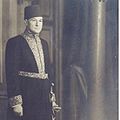Egyptian literature
Egyptian literature is some of the earliest known literature. The Egyptians were the first culture to develop the book.[1]
Ancient Egyptian literature
The ancient Egyptians wrote on papyrus. They also wrote on walls, tombs, pyramids, obelisks, and more. A well-known example of ancient Egyptian literature is the Story of Sinuhe;[2]
Christian Egyptian literature
Alexandria became an important center of early Christianity from around the 1st to 4th century CE. Writing by Coptic Christians was important to Christian literature at that time.The Nag Hammadi library protected some books from being lost or destroyed.
Islamic Egyptian literature
Muslim Arabs controlled Egypt by the eighth century. Libraries and literature were important in Arab Egypt.[3] Several important changes for writers happened at this time. Cloth paper replaced papyrus. Writers began using calligraphy. Also, writers began to write mostly about Islam. The earliest novel written in Egypt was Ibn al-Nafis' Theologus Autodidactus. It was an early science fiction and religious novel.[4]
Modern Egyptian literature
In the late nineteenth and early twentieth centuries, the Arab world experienced a cultural change like the Renaissance. This was called al-Nahda movement. It touched nearly all areas of life, including literature.[5] One of the most important people from this time was Naguib Mahfouz. He was first Egyptian to win the Nobel Prize in Literature. Another important modern writer was Muhammad Husayn Haykal. He wrote Zaynab in 1914. It is an Islamic novel and is called the first modern Egyptian novel.
Notable Egyptian writers
Egyptian Literature Media
Reading hall of the modern Library of Alexandria.
Copy of the Westcar Papyrus on display in the Ägyptisches Museum, Berlin
Despite colonial authorities' banning of Al-Urwah al-Wuthqa in Egypt and India, it circulated widely thanks to an elaborate network including Arab businessmen in Bombay.
A monument dedicated to Naguib Mahfouz in Cairo.
Aziz Pasha Abaza, renowned Egyptian poet hailing from Egypt's largest noble house, the Abaza family of maternal Abazin Circassians and paternal Egyptian descent
Related pages
References
- ↑ Edwards, Amelia, THE LITERATURE AND RELIGION OF ANCIENT EGYPT., archived from the original on 2007-10-20, retrieved 2007-09-30
- ↑ Lichtheim, Miriam (1975), Ancient Egyptian Literature, vol 1, London, England: University of California Press, p. 11, ISBN 0-520-02899-6
- ↑ Groups of books and book production in Islamic Egypt, archived from the original on 2012-11-09, retrieved 2007-09-30
- ↑ Dr. Abu Shadi Al-Roubi (1982), "Ibn al-Nafis as a philosopher", Symposium on Ibn al-Nafis, Second International Conference on Islamic Medicine: Islamic Medical Organization, Kuwait (cf. Ibnul-Nafees As a Philosopher Archived 2008-02-06 at the Wayback Machine, Encyclopedia of Islamic World).
- ↑ MSN Encarta entry on Egypt, Encarta, archived from the original on 2009-11-01, retrieved 2007-09-30






